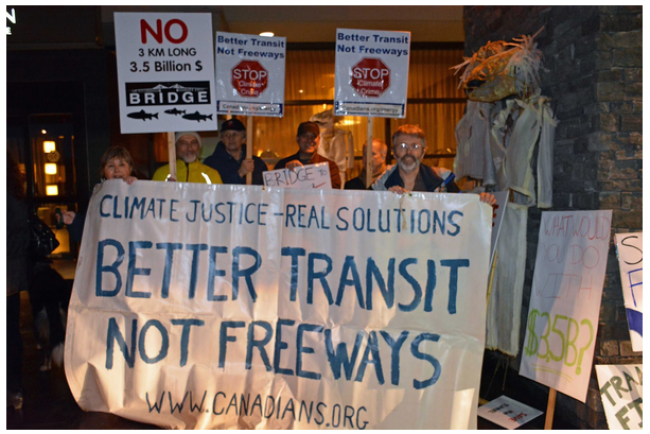Articles Menu

The Council of Canadians has joined with allies to call on the federal government launch an environmental review of the proposed Massey Bridge in Metro Vancouver and to withhold federal infrastructure funding from the project.
For context, the George Massey Tunnel is an existing highway traffic tunnel in Metro Vancouver that is located about 20 kilometres south of Vancouver city centre. The four-lane highway goes under the south arm of the Fraser River estuary and joins the municipalities of Richmond and Delta.
The organizations that sent the letter today are opposed to the plan to replace the tunnel with the ten-lane Massey Bridge. Their concerns include the loss of prime agricultural land to build the bridge, the additional greenhouse gas emissions that come with adding more space for cars, the government's lack of commitment to public transit alternatives, and the bridge's $3.5 billion price tag. They are also concerned that the proposed removal of the George Massey Tunnel could affect the salinity of the lower Fraser River.
A Metro Vancouver committee of mayors is also expected to call on the federal government to ask for an environmental assessment on the Massey Bridge.
A Wilderness Committee media release states, "Resident group Fraser Voices, the Wilderness Committee, Council of Canadians and five other organizations representing over 160,000 members and supporters have sent an open letter urging the federal government to use the money it has promised for infrastructure to fund transit projects in Metro Vancouver instead of the new 10-lane highway bridge. ...Extra vehicles resulting from the Massey Bridge and would add about seven million tonnes of carbon dioxide to the atmosphere over 50 years."
The letter highlights, "Building new freeways when climate change is already impacting BC communities is irresponsible. Adding just one mile of new highway lane increases carbon emissions by 100,000 tonnes over 50 years, according to the Sightline Institute. This bridge proposal feeds a continuing dependence on fossil fuels and is at odds with the ambitious climate goals your government committed to [at the United Nations climate summit] in Paris last year."
Vancouver-based transportation consultant Eric Doherty, who is also a member of the Council of Canadians Vancouver-Burnaby chapter, has written, "Given Trudeau’s statements on the seriousness of the climate crisis, you might expect that the multi-billion dollar infrastructure program he ran on in the election would already be targeted to reduce carbon pollution. You would be wrong."
Doherty notes, "Every dollar of public money spent on roadway expansion is a dollar spent to sabotage the Paris Climate agreement, and to push humanity towards truly catastrophic global warming. Let's help Justin succeed in this tough work, by demanding that not one dollar of public infrastructure money go to increase carbon pollution." To read more of Doherty's analysis, please see his Will Trudeau’s infrastructure plan worsen the climate crisis? blog on rabble.ca.
With the federal government promising to spend $60 billion on infrastructure over the next ten years, the Council of Canadians has argued that as many as 18,000 jobs could be created with every $1 billion of investment in energy conservation and renewable energy systems. We have also highlighted that the average renewable energy investment creates four times as many jobs as the same investment in the fossil fuel economy.
And as noted in the Leap Manifesto, "We want high-speed rail powered by just renewables and affordable public transit to unite every community in this country – in place of more cars, pipelines and exploding trains that endanger and divide us."
The groups that sent the letter today hope that the upcoming federal budget will including funding for public transit initiatives including the Broadway SkyTrain Extension Project, the Surrey Light Rail Transit Project, and rapid bus service along Highway 99, which provides a direct route from the Canada/US border through Vancouver to Squamish, Whistler, and the BC interior.
The federal budget will be delivered on March 22.